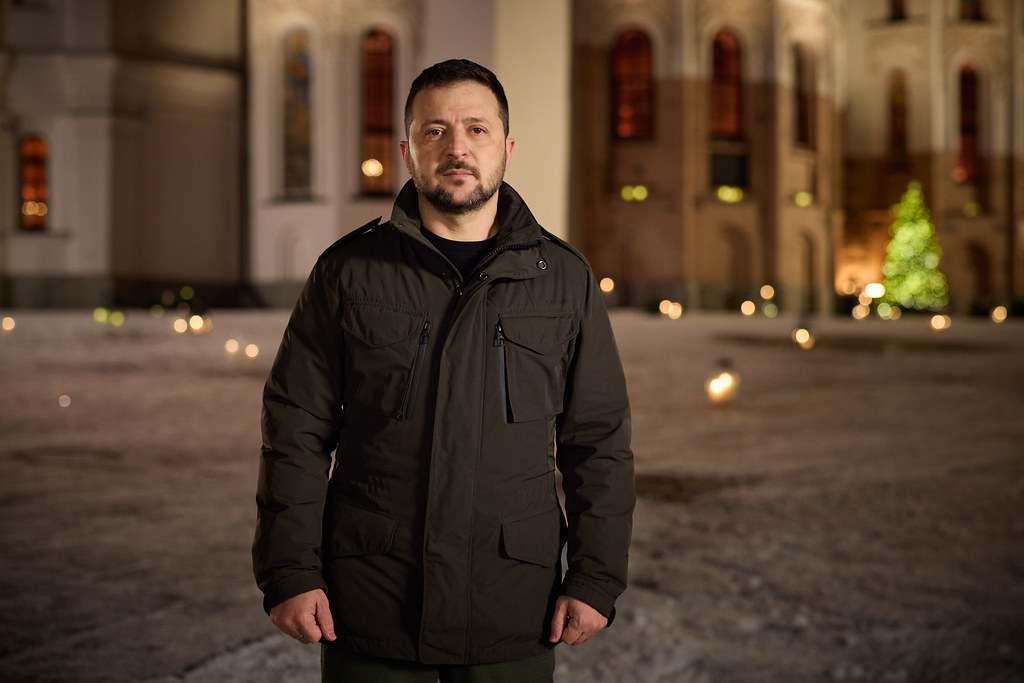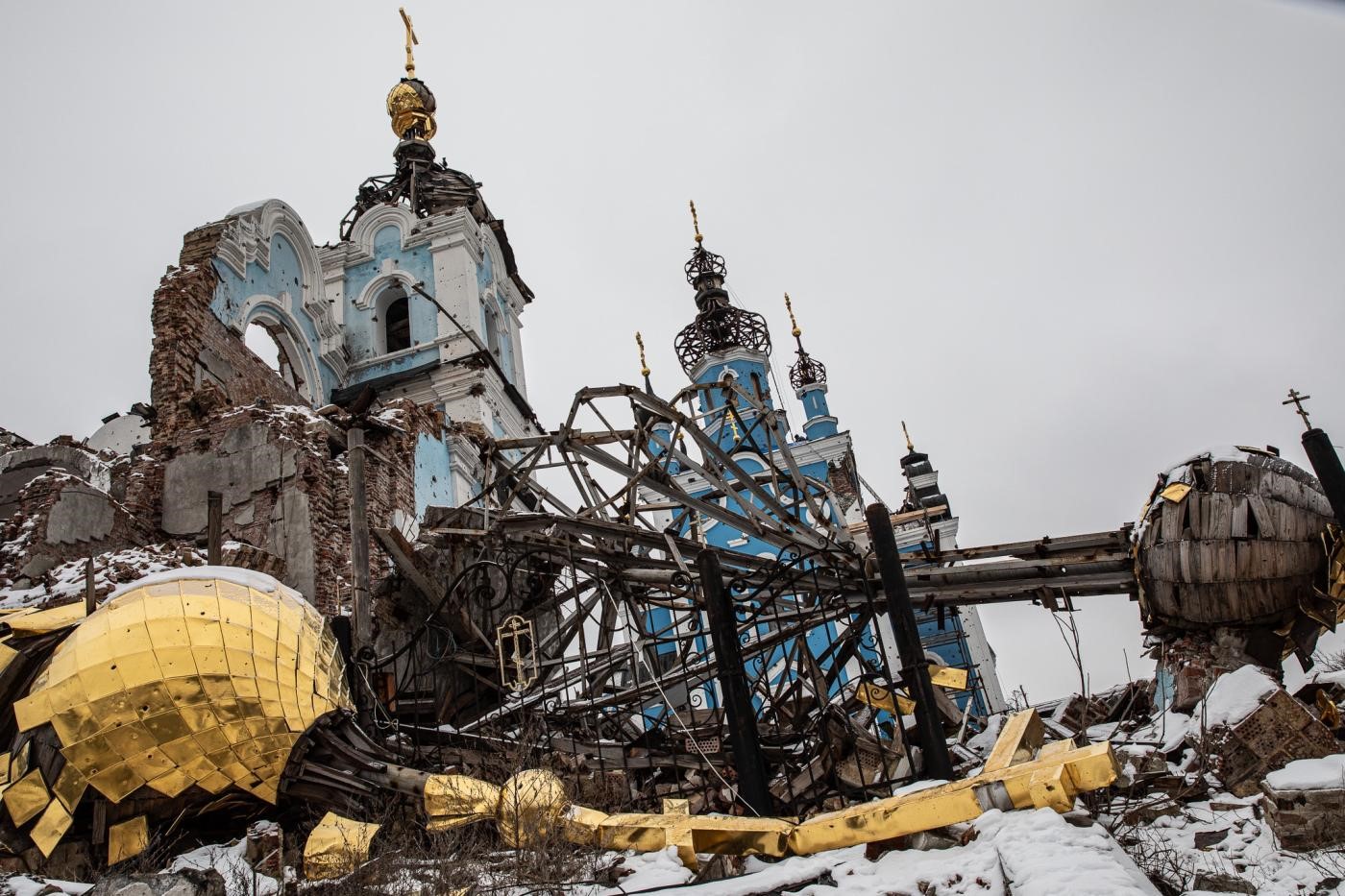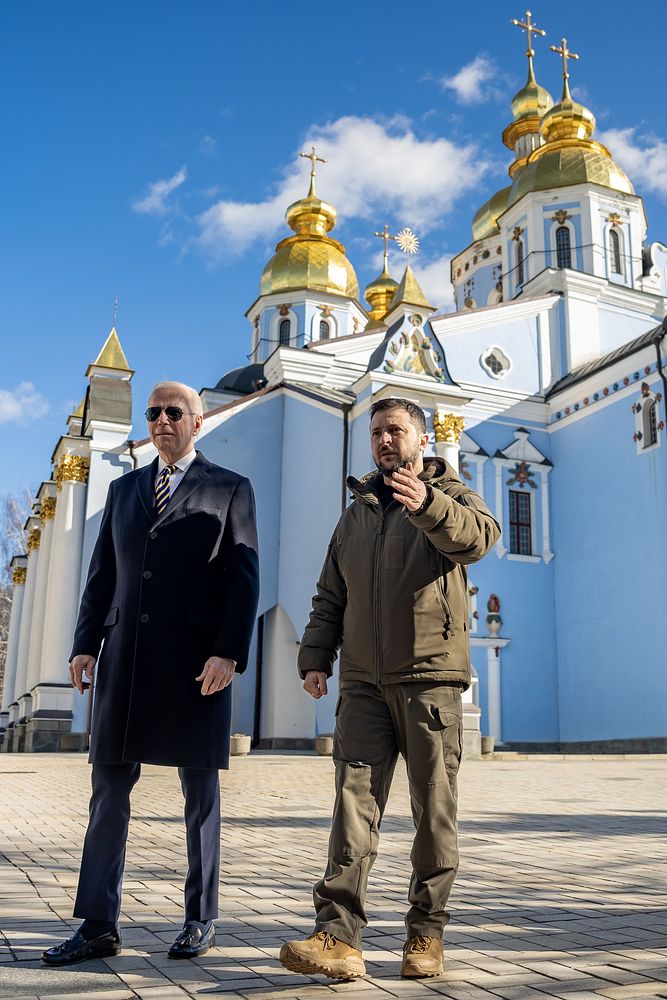Political and military setbacks notwithstanding, Ukrainians continue their advance in the realm of decolonization. An example is the decision to celebrate Christmas no longer on January 7, as the Russian Orthodox Church does, but on December 25, like most Christian churches in the world. Changing the calendar is not only a matter of politics, argues the Ukrainian political analyst Mykola Riabchuk, but also of genuine morality.

President Zelensky celebrates Christmas at the 25th of December 2023. Picture Flickr.
On December 25, for the first time in their history, Ukrainians celebrated Christmas together with all other European nations, in accordance with the ‘new style’ Gregorian calendar. Earlier last year, it officially replaced the ‘old style’ Julian calendar that was used in Ukraine until recently (and still is used in Russia and Belarus) to mark religious holidays.
The difference between the two ‘styles’ might look as a sheer technicality – the result of a minor astronomic miscalculation made as early as 45 BC under Julius Caesar who introduced a new system to count the years. According to this Julian calendar the Earth makes a full circle around the Sun in 365 and ¼ days, so to compensate for one missing day in every four years a leap year was invented. Alas still 11 minutes remained unaccounted for annually, which amounted to an additional 24 hours in every 131 years.
By 1582, when this inaccuracy was finally fixed under pope Gregory XIII, the Julian calendar lagged behind the physical/astronomical reality for 13 days. Since then, the corrected year-counting (the ‘Gregorian’, a.k.a. ‘new Julian’) was generally accepted in the West but largely ignored in the East.
What looked a shere technical problem thus got a symbolic meaning as an expression of two different attitudes towards modernity and tradition, and ultimately of two different religious-cum-civilizational identities.
Soviet legacies
The Bolsheviks as radical modernizers broke with the religious obscurantism predominant in the Russian empire, and adopted the new, ‘scientifically verified’ calendar, as did most nations on the globe. But the Russian Orthodox church sticked stubbornly to the old ‘ancestral tradition’, seeing it as another fence against the schismatic West and godless Bolsheviks.
Since the Ukrainians lost their Orthodox church to the Moscow Patriarchate in 1687, many internalized the major ideological premises of Russian Orthodoxy, including its profound anti-Westernism and increasingly retrograde ‘traditionalism’. For most of them, the obsolete Julian calendar looked quite ‘natural’.
Independent Ukraine inherited from the Soviets a deeply secularized society that did not care much about religiosity and certainly did not bother with questions like how it was possible to lavishly celebrate their secular New Year holiday (1 January) before their orthodox Christmas (7 January), i.e. during Nativity Fasting?
Informally, Soviet people celebrated Christmas and Easter with the same zeal as official secular holidays like March 8 (Women’s Day) or May 1 (International Day of Solidarity of the Working People). Very few, however, attended churches on a regular basis or observed the religious requirements. Even today, only one quarter of Ukrainians state to belong to a certain church parish or religious community, and even less (about 5%) attend church services weekly.
Not a priority till 2014
Predictably, the issue of re-adjustment of the church calendar to the secular one did not loom large in public life. There were incidental voices, since the 1990s, that hinted at change, but the major stakeholders – either in politics or in the Ukrainian Church (or, rather, in multiple churches present in Ukraine) - were not particularly interested in a reshuffle.
Throughout the nineties the Russian Orthodox church, smartly renamed into ‘Ukrainian Orthodox Church of the Moscow Patriarchate’ (UOC–MP, where ‘MP’ was usually omitted), remained dominant in Ukraine. It strictly followed the Moscow ‘traditionalist’ line, while all other churches in Ukraine were too weak and reluctant to fight for an issue that did not promise them any immediate gains, especially in the absence of mass support from the public and/or from the authorities.
The situation began to change in 2014, after the Russian takeover of Crimea and the invasion of the Donbas. Ukraine’s radical break with Russia at last turned into a form of decolonization. Initially it was disguised under the euphemism of ‘decommunization’ (the abolishment of communist heritage). with an adopted set of measures that was too narrow in scope and scale to eliminate all cultural, mental and spiritual legacies of Russia's dominance.
In 2018, under president Poroshenko, things started to change. The Ecumenical Patriarchate of Constantinople, the head of all orthodox churches, through an act of ecclesiastical legitimacy recognised the Orthodox Church of Ukraine as independant from the Moscow Patriarchate. Thus the issue of a change of calendar acquired some practical sense and salience as an important element of symbolic distancing from Russia. The Russian Orthodox Church was adamant and broke all ties with Constantinople.
After that scandalous schisma both December 25 and January 7 were recognized as official state holidays in Ukraine, though the former date was seen rather as a concession to the Ukrainian Catholics than as encouragement of Orthodox believers to celebrate Christmas on the 'western' date as well.

Orthodox Church in Bohorodychne, Donetsk Oblast. The village came under attack by Russian forces in June 2022. Photo: Volodymyr Kutsenko.
Radical steps
After the Russian invasion in 2022, however, the Ukrainian churches took a more radical step by allowing their parishes to choose which calendar they want to follow. In July 2023 the Ukrainian parliament officially approved the shift of Christmas as a national holiday from January 7 to December 25. All other religious holidays, like Easter and Pentecost, were also adjusted to the 'western' Georgian calendar.
At the same time, both the government and the churches allowed parishes and individuals to celebrate according to the old dates or even on both dates, as many secularized Ukrainians were happy to do. Of 75 percent of Ukrainian citizens who define themselves as ‘Christians’, only 15% oppose the calendar shift, while 50% support it, whereas the remaining don’t know or don’t care.
The government’s flexibility seems to pay off. The change was introduced in a way that did not encroach upon anybody’s personal or institutional freedom. At the same time, it questioned and indirectly delegitimized the alleged ‘sacredness’ of the Orthodox tradition staunchly defended by Moscow. It promoted rationality in an area which was generally not very rational and provided a soft transitional period toward the desired goal.
The Russian all-out military invasion accelerated a process that otherwise would have unfolded much slower but probably smoother. It placed the Russian Orthodox church in Ukraine (UOC-MP) in an awkward position. Even though its hierarchs had lukewarmly condemned the aggression, they stopped short of breaking all ties with their maternal institution in Moscow, even though it fully sided with the Kremlin in its genocidal war.
Make no martyrs
The Ukrainian government since the invasion was under mounting pressure from radicalized citizens demanding a ban of the Russian Orthodox church in Ukraine, especially after its numerous priests and hierarchs were caught up at subversive activities, sabotage, and pro-Russian propaganda or other forms of collaboration with the Russian occupiers.
In a nationwide opinion poll held in December 2022, only 12 percent of the respondents said that the state should not interfere in the affairs of the Russian Orthodox Church, while 54% supported a complete ban of this church and 24% supported a milder option: to establish state supervision and monitor the activities of the church and its representatives.
In October 2023, the Ukrainian parliament by an overwhelming majority (267 vs. 15) voted for legislation to prohibit the activities of religious organizations ‘that are affiliated with centers of influence of a religious organization […] which is located outside of Ukraine in a state that carries out armed aggression against Ukraine.’
After its second reading in parliament, the law should now be signed by the president who seems reluctant, however, to undertake such a radical measure. The president is probably aware of negative international repercussions but also, as some insiders suggest, dislikes the prospect of making Russian clergymen into martyrs.
Real estate without parishioners
The paradox is that, technically speaking, the Russian Orthodox Church (UOC-MP) still remains the largest church in Ukraine. It owns almost 12,000 parishes – more than all other churches together. This does not necessarily correspond with the number of active parishioners and their engagement; rather, it reflects Soviet legacy when the Russian Orthodox Church was the only legal church in Ukraine and, as such, inherited most of the parishes, churches and other property.
This provided UOC-MP with a huge structural advantage over other churches that had, in most cases, to develop their communities and build infrastructure from scratch. Close relations with both Ukrainian and Russian oligarchs and the oligarchic governments in both countries provided the Russian Orthodox church with substantial resources and leverages.

US-president Biden at St. Michael Monastry in Kyiv. Picture: Government of Ukraine.
That situation began to change only in 2014 but the process gained momentum in 2022. By July of that year, only 4 percent in a nationwide survey declared belonging to the UOC-MP, while 54% proclaimed loyalty to the OCU (Orthodox Church of Ukraine under the Ecumenical Patriarchate in Constantinople).[3]The decline of the Russian Orthodox church in Ukraine seems to be quite a natural process, so the government might be right when avoiding harsh measures against it, trying instead to delegitimize rather than to delegalize it.
Russian bombs delegitimize Russian church
The re-adjustment of the calendar suits this strategy pretty well. On the one hand, it does not target the UOC-MP directly, since its parishes and believers still are free to choose when to celebrate. On the other hand, the measure targets its self-proclaimed role of the bearer of ‘tradition’ and undermines its overblown exceptionalism and alleged superiority over other churches. Remarkably, the UOC-MP believers are not unanimous in their rejection of the introduced change. In November, 21 percent of them approved the measure, 61% opposed, and the remaining expressed no clear opinion.
No laws, or pamphlets, or treatises can delegitimize the Russian church more than the Russian air strikes that target civilian objects and indiscriminately destroy the churches of all confessions. In this situation, an official ban on the Russian Orthodox church in Ukraine may rather prolong its inglorious life than end its agony. The only way for that church to assume any decent role in Ukrainian society is to fully break all ties with Moscow.
This is not only a matter of politics but also of true morality.
